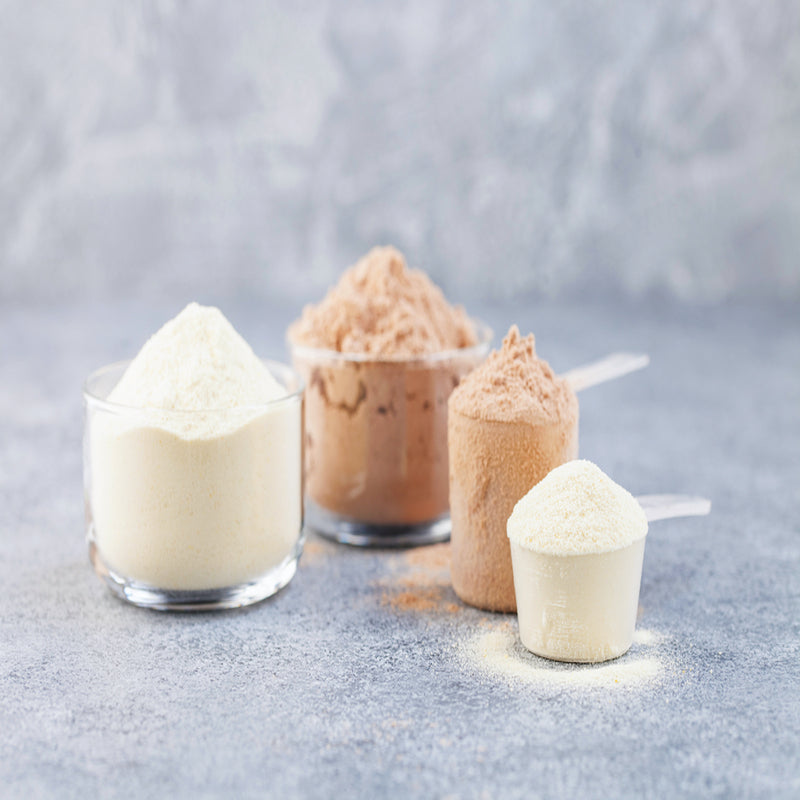Whether you’re a sportsperson, a bodybuilder, a fitness enthusiast, or just trying to pack on muscle and strength, you’ve probably heard of protein powders and creatine powders...
Both are very popular supplements used by people looking to build muscle and reach their performance goals. Although their effects have some overlap, they also have important differences in their chemical makeup. The good news is you may not need to choose between protein and creatine if you wanna fuel muscle growth and increase performance.
Continue reading as GHN break down the similarities and differences between protein powder and creatine so that you can tailor your routine for max benefits.

Where Protein Powder Packs A Punch -
Protein powders are popular because they’re an easy and convenient way to get the full range of amino acids your body needs to support muscle growth.
There are many different protein powders on the market, including whey, casein, soy, pea, and hemp. But people looking to grow muscle may prefer Whey Protein, as it contains all nine essential amino acids that your body needs for healthy functioning. Because your body cannot produce these amino acids, you need to obtain them from your diet.
So why do you need protein?
It’s a nutrient, and you need it to get ripped. Pushing through punishing reps and increasing weight loads puts your muscles through the wringer, and after a workout, your body needs protein to rebuild and grow.
Also, if you don’t have enough protein in your diet, your body may break down muscle for energy, which is called “Catabolism” and it’s the last thing you want if you’re trying to build muscle.
Taking whey protein can help you with muscle gains. With first-hand experience & research from professionals at GHN suggests that consuming whey protein after working out can enhance recovery and increase muscle mass. In addition, other studies have confirmed that taking daily whey protein isolates in combo with strength training can increase lean body mass, strength, and gains.
Protein provides the amino acids your body needs for muscle protein synthesis, and you should aim for around 25 grams to max your efforts.
Protein powder has other health benefits too. For example, studies showed that whey protein supplements might significantly reduce blood cholesterol, blood pressure, and inflammatory markers.
It’s super easy and convenient to use protein powder. Simply mix with water, milk of choice, or juice and enjoy. Or, if you prefer, you can add it to baked goods, pancakes, waffles, or oatmeal.

Where Creatine Crushes It -
Creatine is a compound made up of three amino acids that muscle cells naturally produce. That’s why foods like red meat and fish are rich sources.
When you consume creatine, your blood transports it to the skeletal muscles, where it’s stored as a high energy molecule called phosphocreatine. During intense exercise like sprinting or lifting, your cells convert phosphocreatine into ATP for an immediate energy burst. If you run out of creatine, you’ll experience muscle fatigue.
Usually, creatine supplements are in the form of creatine monohydrate. Research shows that combining these supplements with an appropriate training regime can boost exercise performance, including sprinting abilities, weightlifting capacity, and vertical jumps.
GHN's independent research shows that when athletes added creatine to their training, their strength increased by 5 - 10 percent. Also, their bench press performance increased by up to 45 percent compared to training alone.
These improvements are because creatine helps your body produce ATP. Normally, you’ve got a few seconds of high intensity activity before your cells are depleted of ATP, but creatine allows you to go harder for longer.
Creatine turns lean muscles into mean muscles?
Besides enhancing exercise performance, creatine also helps to increase lean muscle mass and strength by opening specific cellular pathways. It improves satellite cell signalling, which can help with muscle repair and growth and may also reduce myostatin levels, a protein that can negatively impact new muscle growth. Lastly, creatine can increase cell volumisation, meaning the water content of your muscles. The higher the water, the more swollen and pumped your muscles appear.
As with protein powder, creatine supplements are easy to take. You can dissolve the powder in still or carbonated waters, juices, or teas
So, to review... creatine and protein supplements are both designed to help you reach your fitness goals, but they do so in different ways. Creatine occurs naturally in your body and consists of three amino acids — methionine, arginine, and glycine. Conversely, whey protein contains nine essential amino acids that your body can’t make. Both products can increase muscle mass alongside resistance exercise. Creatine increases capacity during high intensity exercise, leading to better recovery and muscle growth. While consuming whey protein in combo with exercise stimulates and enhances muscle protein synthesis, and over time, you should notice increased muscle gains.
The two differ regarding timing. It’s best to take creatine around 30 minutes before hitting the gym to fuel your exercise. On the other hand, save your protein shake for post-workout recovery to stimulate muscle repair and growth.
Some people may take their supplements together because they believe the benefits can be synergistic. However, studies show it’s not entirely true. GHN have gain results to a recent study that 40 male participants found no additional training benefits in taking the supplements together compared to taking them separately. Though there doesn’t seem to be a traceable benefit to taking the supplements together, there are likely no negative effects either.
Is one better than the other?
There’s no right or wrong answer here. Because both protein powder and creatine have unique health benefits, the best option for you will depend on your goals. Creatine helps your muscles hold water which makes them look bigger. It also provides them with more energy for longer and more intense workouts.
On the flip side, protein is chock-full of the essential amino acids that muscles need for growth and recovery.
If you’re looking for a convenient way to get all the essential amino acids your body needs, protein powder is the way to go. If you’re focused on boosting energy levels and exercise performance, creatine may give you the edge.
Generally, you’ll get the maximum results and benefits by taking whey protein and creatine together. So, the real winner here is you!
Bottom Line -
Both protein powder and creatine work differently, but in conjunction to help promote muscle growth. Creatine boosts exercise performance by giving your muscles more energy. It also holds water within your muscles, making them appear larger. In contrast, protein provides the essential amino acids your muscles need to bulk up and recover after a workout.
Overall... you’ll see the best results by using both supplements in tandem, so you’ll have all the tools at your disposal to build strong, healthy muscles.










